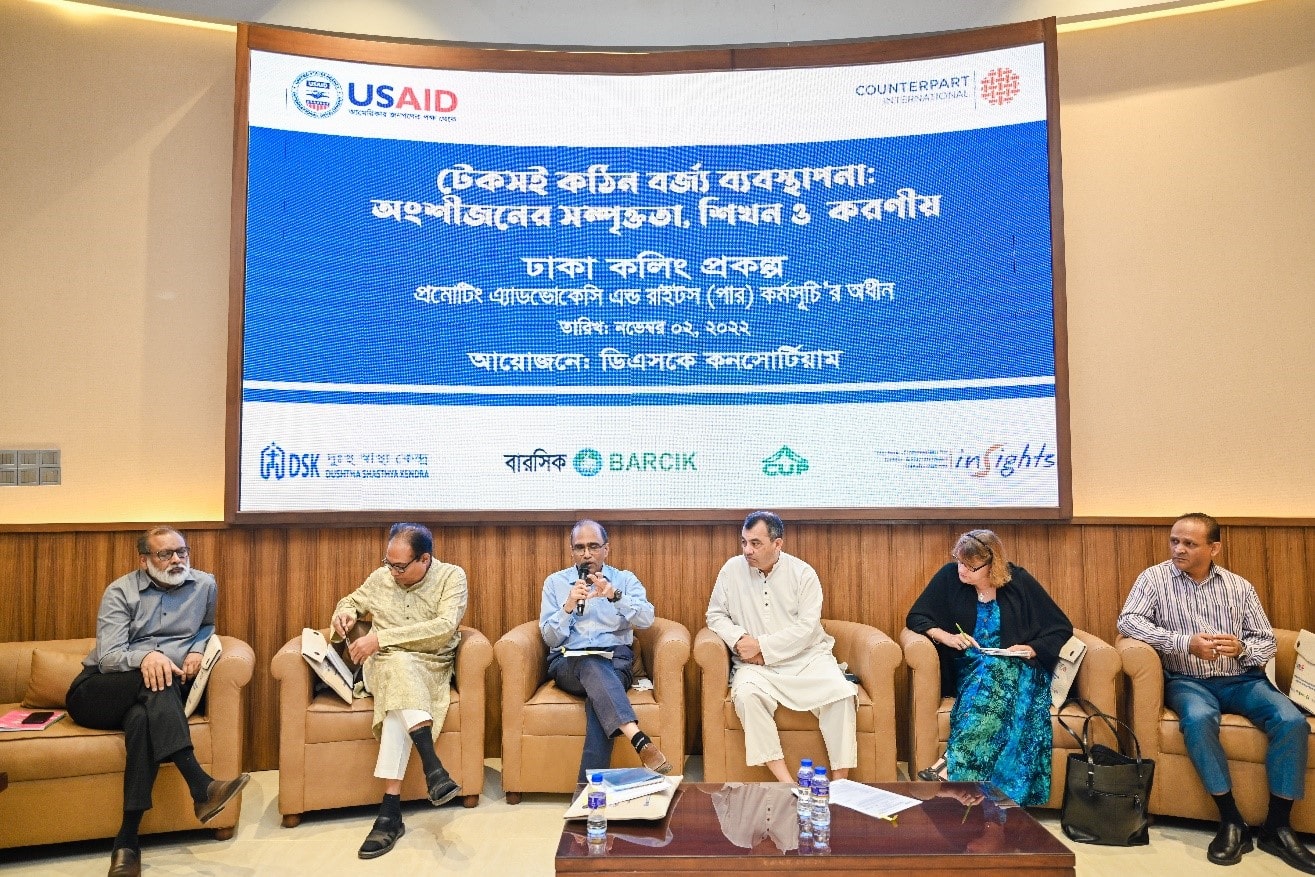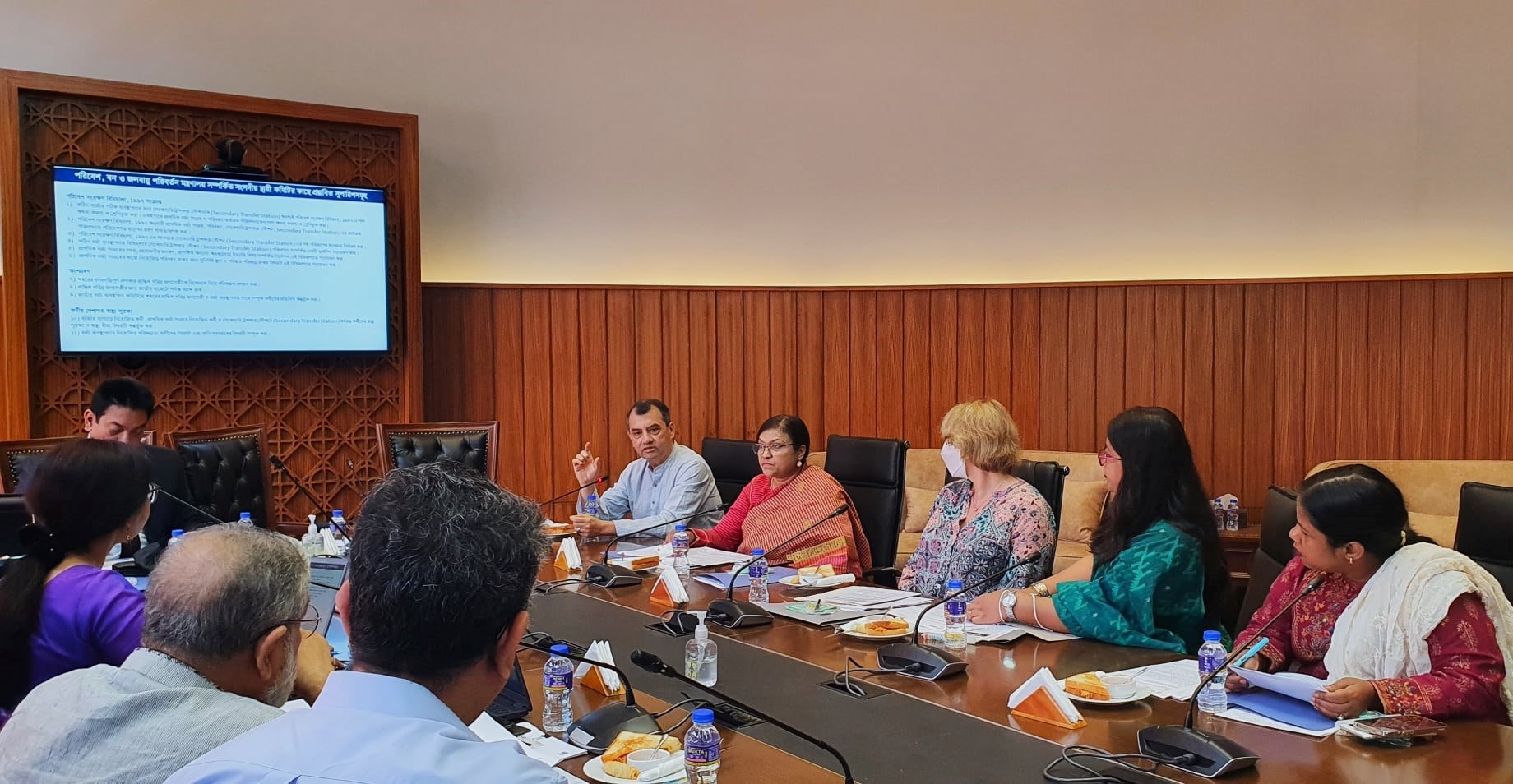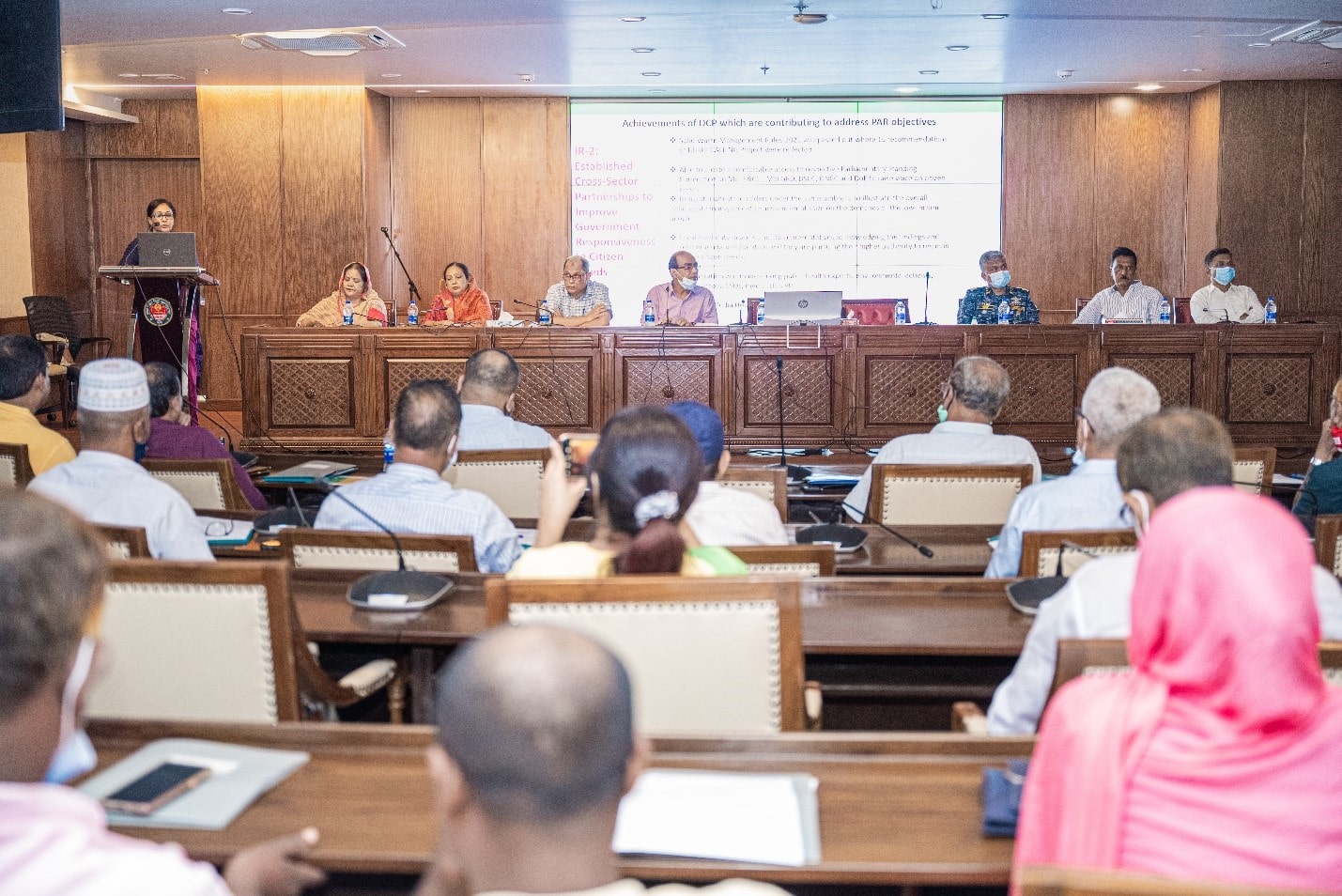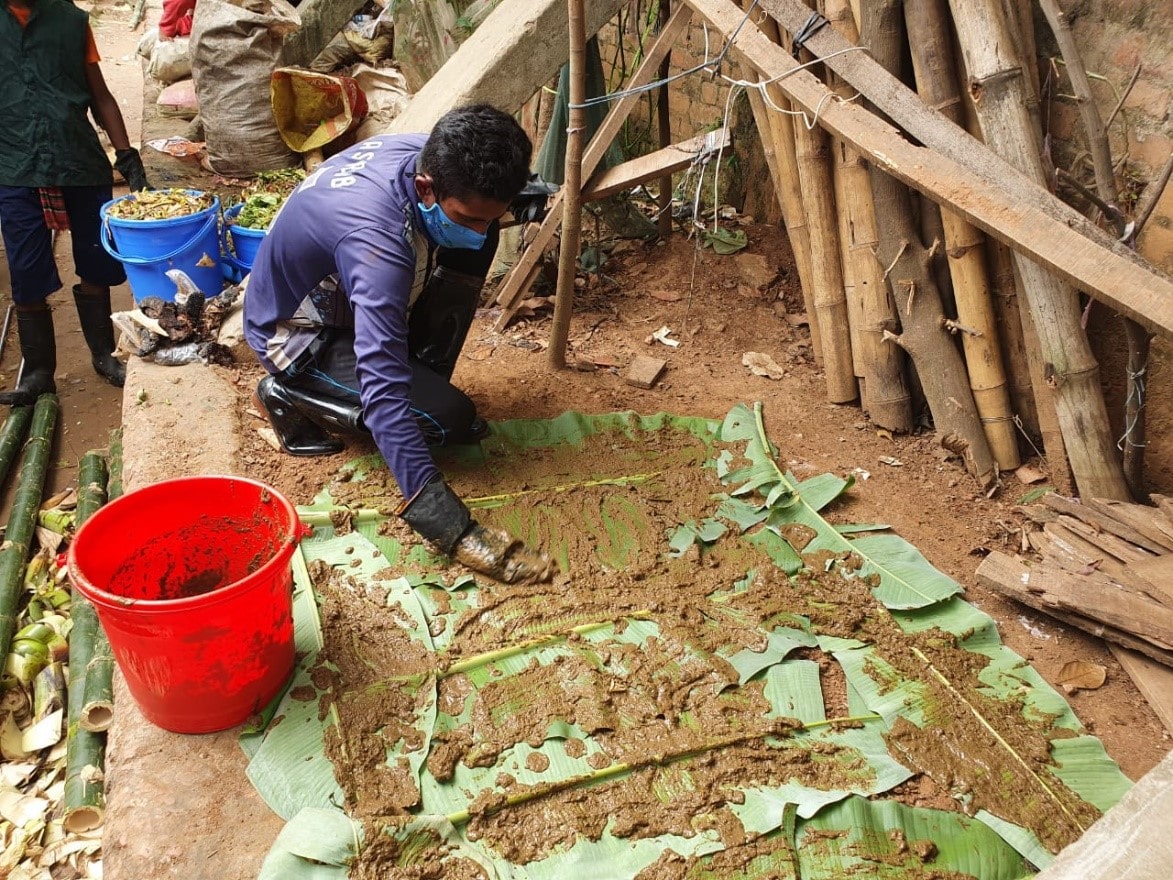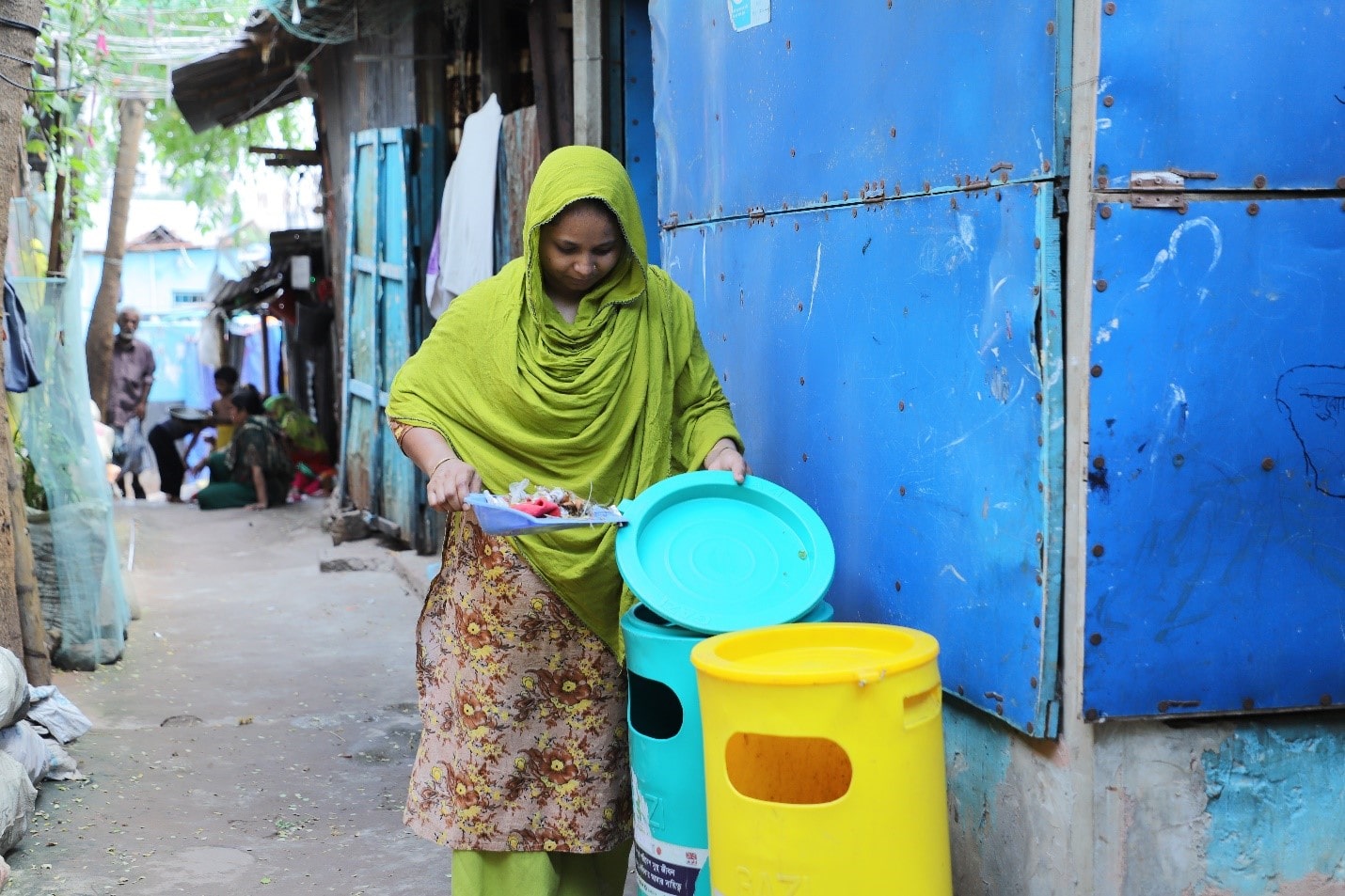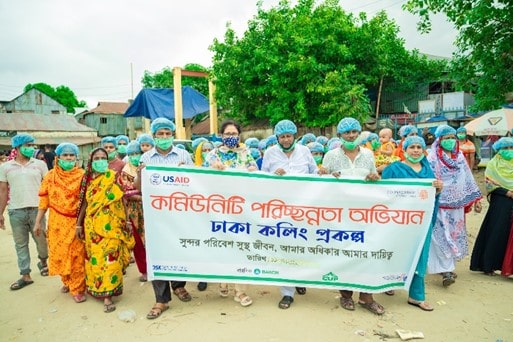Dhaka Citizens’ Advocacy Collaboration Against Polluting Environment (DHAKA CALLING) Project
Environmental democracy focusing on solid waste management has become a major concern for city dwellers, especially for the lower-income community (LIC) groups whose voices are rarely heard and participations are barely seen in the recent shrinking democratic practice processes of our country. Policy gaps and loopholes coupled with the complex nature of city governance labyrinth the rights and service delivery mechanism system rest assured in the constitution. Recognizing these issues, the project identified the common ground of interest suitable for all relevant actors that facilitate a sense of ownership, access to information, increased civic participation, and widened civic space to share thoughts and knowledge, especially for community people to raise their voices.
| Project Duration | Target population | Implemented Places | Donor | Budget | Goal |
|---|---|---|---|---|---|
| January 14, 2021 to May 31, 2023 | 57800 (Male: 17340, 30% & Female : 40460, 70% ) | Molla slum of Ward-06 & Korail slum of Ward-19 under Dhaka North City Corporation (DNCC) and Hazaribag Boubazar slum of Ward-14 & Hazaribagh Balurmath slum of Ward- 55 under Dhaka South City Corporation (DSCC). | United States Agency for International Development (USAID) and Technical Assistance provided by: Counterpart International (CPI) |
|
To improve implementation and enforcement of environmental laws and rules in response to identified community needs pertaining to pollution in 2 Wards of DNCC and 1 Ward of DSCC. |
Objective
- To build capacity and awareness of 4 Community-based Organizations (CBOs) and their 3 Federations to share and influence their community members and relevant city authorities to follow and implement the identified (3 nos.) laws in 4 slums.
- To promote a collaborative relationship with 2 City Corporations and the Department of Local Government (MoLGRD) to develop 2 case studies of the implementation of the identified laws.
- To solve at least 2 community-level environmental problems through advocacy initiatives of the targeted Slum communities.
The project experienced that civic voice with adequate information, increased capacity and defined advocacy strategy mobilizes community people better and amplifies the chances of people participation and widening civic space in the process of promoting good governance. Incorporating the most marginalized groups through adopting a bottom-up approach generated a feeling of belongingness among the community people which strengthened and expedites the process. Extracting core problems and probable way-outs by engaging all relevant stakeholders that include champions, spoilers, prime sector actors, media, activists, experts, etc. easier the process of developing cross-sectoral partnerships with multiple stakeholders. The project also generated evidence by conducting research and demonstrating the CLWMS pilot model to all relevant stakeholders through a defined advocacy strategy. In addition, increased collaboration and coordination with the media bolster the confidence of the community people in the process of promoting civic engagement and collaboration with the government and LGIs. Apart from generating evidence regular monitoring of the processes and impacts of each activity, and evaluating them to decide the next course of action keep the project in line with the desired goals and objectives. Community people also monitored the services provided by the LGIs and responsible duty bearers and informed them using predefined advocacy tools, techniques, and platforms. The use of media tools on identified interest areas, allowing all parties to have their stake alongside media monitoring with higher coordination with them created a greater impact on the targeted stakeholders. Different types of social mobilization that includes campaign on different social media platforms with digitalized youths and ornamental CBOs and Federations carry forward the identified issues among the key policy actors and decision-makers who also worked in favor of the project. Flexible project management, instructive guidance from donors, uses of strengths, expertise, diversified skills, and capacity of each consortium partner coupled with smart work distribution and alignment of organizational goals and objectives with the project goal and objective created an excellent team spirit which navigated properly towards achieving targeted goals and objectives. Solid waste management (SWM) is not only related to the environment, environmental human rights, public health, climate change, power, food security, etc. but also closely connected to sustainable development goal (SDG) – 3, 5, 6, 7, 10, 11, 12, 13 and 17.
Achievements
- United community people with increased knowledge, skills, and capacity on SWM have been stirred to raise their voices in various forms for their rights and assured their participation in different platforms ranging from local level to Parliamentary Standing Committee (PSC), with the technical support of the Dhaka CALLING, was the major achievement of this project.
- The project raised identified issues to responsible service providers, duty bearers, city authorities, govt. officials, and policymakers in name of submitting memorandums, applications, sharing findings, and/or other activities to improve governance on SWM.
- The project digitalizes youth groups as well with increased knowledge on participatory video making (PVM) and initiated a social media campaign that reaches over 150K people focusing on solid waste management (SWM).
- The project repeatedly engaged PSC on the Ministry of Environment, Forest and Climate Change (MoEF&CC), Ministry of Local Government, Rural Development and Cooperatives (MoLGRD&C), Dhaka City Corporations (DCC), zonal offices of DCC, people’s representatives, Local Government Institutes (LGI), Civil Society Organizations (CSO) and marginalized community people and follow them up to address citizens needs on identified priorities.
- The project also focuses on demonstrating a model in the community to strengthen its advocacy efforts that could further be adopted and replicated in other parts of the country. Demonstration of a model not only increases the confidence of the community people but also helps policy makers in deciding technological options that could best fit considering the geographical situations and socio-economic context of the country.
- The conduction of three studies- (i) Sustainable Solid Waste Management for the Urban Poor, (ii) Health Impact of Solid Waste Management in Four Slums of Dhaka City, and (iii) 4R Road Map on Solid Waste Management, and further testing them at the field level and examine with all relevant stakeholders to uplift the bigger picture of the environmental democracy issues was an incredible success of the project. The findings of the conducted studies have been shared with the government to develop a way forward on the SWM issue worked in favor of the project.
- 15 recommendations have been addressed (directly, indirectly, or partially) in SWM rules 2021 is the most significant achievement of this project. These recommendations mostly came out from the conducted studies and field-level interventions. This was only possible due to the increased capacity of the community people and collaborative working relations with the government.
- The Dhaka CALLING Project (DCP) targeted the Environment Conservation Act (ECA) 1995 and reviewed and scrutinizes the Environment Conservation Rules (ECR) 1997 in relation to solid waste management environmental democracy loopholes and governance practices in the country. The results of these efforts have been reflected in the new gazette of Environment Conservation Rules 2023, issued by the Ministry of Environment, Forest and Climate Change (MoEF&CC) on Sunday, March 05, 2023. 10 recommendations raised by the DCP reflected (directly/indirectly) in this ECR 2023
- Mr. Tanvir Shakil Joy MP, PSC member on MoEF&CC has been nominated as the ‘focal person’ for DCP. The country has many policies closely connected to SWM but never had a dedicated road map to manage its solid wastes which evokes the project to step forward on drafting the 4R Road Map on SWM and receive the acknowledgement from the PSC chair on MoEF&CC to use this study as referral document to adopt further policy steps on SWM. A restart of ward-level waste management coordination meetings, zonal level NGO coordination meetings, etc. are the reflection of excellent collaboration, coordination, and cross-sectoral partnership with the government.
- The community-led waste management system involved 7756 families at the community level. This replicable pilot model provided community people with some vans, trolleys, bins, baskets, drums, etc. with improved KAP on SWM. 1353 family is working on waste segregation and composting in Molla and Hazaribagh slum area. They are also provided different types of training, ensured their participation in different advocacy events, enhanced their social mobilization skills, conducted different types of campaigns and mass awareness-raising activities engaged around 57800 people which increased their capacity in protecting their civic rights.
- The project closely worked with the media houses and developed linkages and networks with them. Over 100 media houses publish over 300 media reports considering the importance of the identified project issues. Over 145 government officials and 9 policymakers engaged in different advocacy events of the project facilitated a greater cross sectoral-partnerships. A media pool on SWM has been developed under the project and it is working closely to monitor environmental democracy issues.
- The promotion of women and youth leadership start shaping many decisions at community level through their active participation in different local platforms and the decision making options, innovative ideas, negotiating skills with local leaders and finding alternative ways of survival using their limited resources and opportunities.












